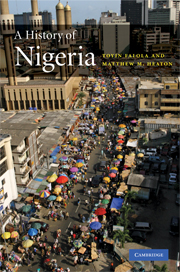Book contents
- Frontmatter
- Contents
- List of illustrations
- List of maps
- Acknowledgments
- Chronology
- Notable people in Nigerian history
- List of abbreviations
- Glossary
- Map 1 Major cities and ethnic groups in present-day Nigeria
- Introduction
- 1 Early states and societies, 9000 BCE – 1500 CE
- 2 Slavery, state, and society, c. 1500 – c. 1800
- 3 Political and economic transformations in the nineteenth century
- 4 Transition to British colonial rule, 1850 – 1903
- 5 Colonial society to 1929
- 6 Nationalist movements and independence, 1929 – 1960
- 7 Instability and civil war, 1960 – 1970
- 8 Oil, state, and society, 1970 – 1983
- 9 Civil society and democratic transition, 1984 – 2007
- 10 Nigeria and Nigerians in world history
- Concluding remarks: corruption, anti-corruption, and the 2007 elections
- Notes
- Selected bibliography
- Index
10 - Nigeria and Nigerians in world history
Published online by Cambridge University Press: 05 June 2012
- Frontmatter
- Contents
- List of illustrations
- List of maps
- Acknowledgments
- Chronology
- Notable people in Nigerian history
- List of abbreviations
- Glossary
- Map 1 Major cities and ethnic groups in present-day Nigeria
- Introduction
- 1 Early states and societies, 9000 BCE – 1500 CE
- 2 Slavery, state, and society, c. 1500 – c. 1800
- 3 Political and economic transformations in the nineteenth century
- 4 Transition to British colonial rule, 1850 – 1903
- 5 Colonial society to 1929
- 6 Nationalist movements and independence, 1929 – 1960
- 7 Instability and civil war, 1960 – 1970
- 8 Oil, state, and society, 1970 – 1983
- 9 Civil society and democratic transition, 1984 – 2007
- 10 Nigeria and Nigerians in world history
- Concluding remarks: corruption, anti-corruption, and the 2007 elections
- Notes
- Selected bibliography
- Index
Summary
INTRODUCTION
The previous chapters have focused on historical processes within the geographic region of Nigeria and the ways in which internal and external factors have helped to shape that history. This chapter diverges from the pattern to discuss the ways in which Nigeria and Nigerians have influenced and affected historical processes in the rest of the world. For many centuries people from social groupings within modern-day Nigeria have traveled beyond their homelands, spreading throughout the African continent and beyond, to the Middle East, south and east Asia, Europe, and the Americas. In so doing, many migrants have established permanent homes in new lands, representing an important sector of the African diaspora that has so impacted world history. Others, particularly in the twentieth century, have established semi-permanent, transnational communities throughout the world.
Both the diasporic and transnational types of migrants have maintained social and cultural connections to their homelands in Nigeria, while simultaneously influencing social and cultural patterns in the lands through which they have traveled and in which they have settled. These diasporic and transnational communities of Nigerians abroad have served as important connections between Nigeria and the rest of the world, while also illustrating Nigeria's impact on human development across the globe. The first half of this chapter discusses the spread of people from the Nigerian geographical zone through time and space and the circumstances that influence their movement, with a focus on how these migrants have had an impact on the places to which they have traveled and in which they have settled.
- Type
- Chapter
- Information
- A History of Nigeria , pp. 243 - 270Publisher: Cambridge University PressPrint publication year: 2008

